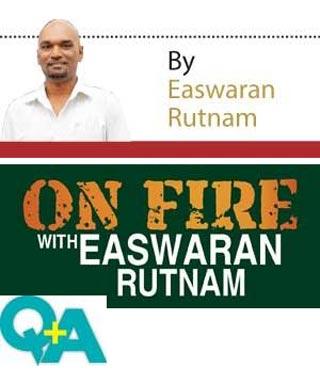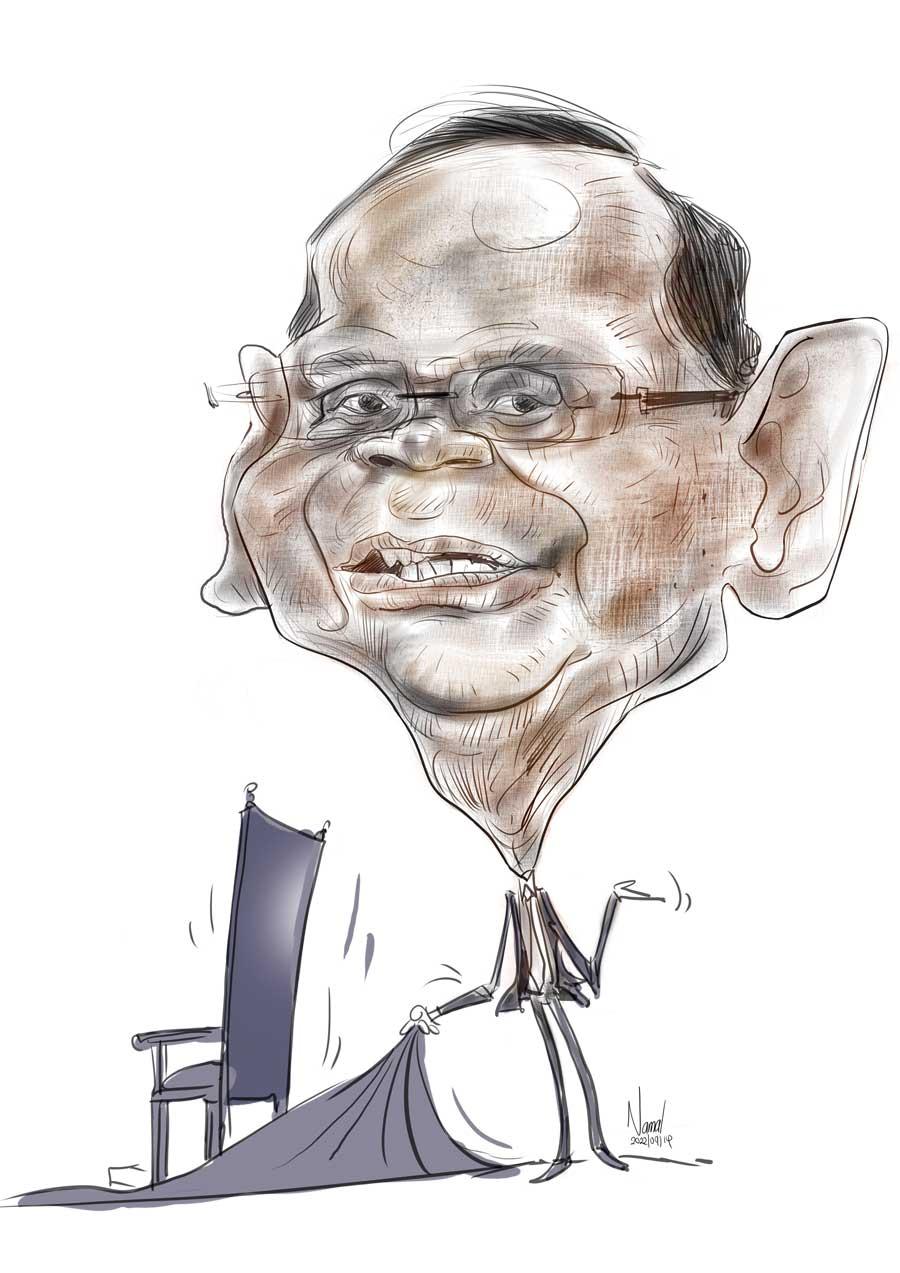16 Sep 2022 - {{hitsCtrl.values.hits}}
The Sri Lanka Podujana Peramuna (SLPP) came out with a bang when it was formed and eventually grabbed power. However, the alliance recently saw yet another split with a group led by former Ministers G.L Peiris and Dullas Alahapperuma deciding to cross to the opposition benches and sit as independent MPs. Speaking to Daily Mirror, Professor G.L Peiris, who is still the Chairman of the SLPP, said that an outside force was now controlling the SLPP. He also said that the SLPP had deviated from its original policy.
Excerpts of the interview:
 Q: What really made you and your group defect from the SLPP and sit with the opposition in Parliament?
Q: What really made you and your group defect from the SLPP and sit with the opposition in Parliament?
I am not sure the word “defection” is appropriate because we have made it very clear we continue as an independent group within the SLPP. But we will sit in opposition. Our contention, very consistently, has been that we represent the identity and policy of the SLPP. That can be clearly shown by scrutinizing the manifesto of the SLPP, its constitution, and more particularly everything that we said at political platforms up and down the country, particularly during the leadup to the Parliamentary elections of August 2020. Mahinda Rajapaksa as the leader of the party and I as the Chairman appeared on each of those major platforms in every district of the country. And we placed before the people a very clear programme of work. It was a substantive agenda. For which was asked for the support of the people. We received that in resounding measure. 143 MPs out of the 225 MPs were returned to Parliament on the SLPP ticket. What for? To implement the programme that we agreed with the people. The social contract between the voters and the MPs elected by the voters.
But what happened next? What was done in Parliament was a complete distortion, an absolute reversal of the solemn pledges that we gave to the people. So here you have the mandate turned upside down. That is no exaggeration. We ended up supporting the candidate of the party against whom we campaigned very vigorously. So we let down the people of the country in general, and the SLPP supporters in particular.
We felt there is a huge draconic in the political system and there really does need to be a platform to accommodate the aspirations of the SLPP supporters. That is what we are trying to do.
 We ended up supporting the candidate of the party against whom we campaigned very vigorously. So we let down the people of the country in general, and the SLPP supporters in particular We ended up supporting the candidate of the party against whom we campaigned very vigorously. So we let down the people of the country in general, and the SLPP supporters in particular |
 Q: Is it really a policy decision that you moved out or was it because you were not given positions in the new Government?
Q: Is it really a policy decision that you moved out or was it because you were not given positions in the new Government?
We could have had any position we wanted in the Government. That was on offer, on a platter. But we said no. But we will contribute in a manner that a contribution is required.
Q: As SLPP Chairman are you still attending party meetings?
No. There is a small group of people who have taken over the party.
But that’s a very strong group of people. Among them are Basil Rajapaksa, Mahinda Rajapaksa and Namal Rajapaksa. The key players in the SLPP are still part of that group.
But in this day and age is that how you constitute a political party? Are political parties organised on that basis? We are not living in the middle ages. We are living in the 21st Century. A party must have popular appeal. You have decisions being made by a small group of people whether that reflects the aspirations of the vast mass of the party is questionable.
Q: Who is calling the shots in the SLPP?
The fact is it is an invisible hand that controls everything. There is so much feeling in the country about the excessive powers attached to the Executive Presidency. People are saying it is too powerful and that it has a chilling effect on other institutions. But don’t forget that the Executive Presidency operates within the framework of the law. But today you have a majority of SLPP members controlled by a force outside Parliament who is not accountable to anybody under the sun.
The President, powerful as he is, has only one member of Parliament, Wajira Abeywardena. So, the President is reliable on the SLPP. The SLPP can pull the rug from under his feet at any time. The President is totally dependent on the SLPP.
 A party must have popular appeal. You have decisions being made by a small group of people whether that reflects the aspirations of the vast mass of the party is questionable A party must have popular appeal. You have decisions being made by a small group of people whether that reflects the aspirations of the vast mass of the party is questionable |
Q: Does your group have the support of the public in numbers?
Definitely. We spent three days in Anuradhapura and a cross-section of people right across the political spectrum met us, particularly professionals. Our group of 13 people consists of University Professors, PHD holders, members of the legal profession, doctors, etc. We were greatly encouraged by the response of the professionals and academics in Anuradhapura. Businessmen and grass-root politicians. This is the beginning of a journey but the response so far has been very positive and enthusiastic.
Q: We saw Anuradhapura decorated with half UNP flags and half SLPP flags. Is that what we told the people during the elections? Did we say that we will team up with the UNP? Is it fair by the people to get votes on a false premise?
At the election in Parliament about 101 MPs of the SLPP voted for the UNP Leader. The UNP Leader is somebody whose strengths I recognise. He was my student in the Faculty of Law. I know what his strengths are. But the fact remains that the people rejected him. Even his own constituency rejected him.
Q: But having said that, Mahinda Rajapaksa and Gotabaya Rajapaksa have also now been rejected by the people. So what is the alternative?
The alternative does not consist of personalities. The alternative consists of ideas, of policies of freshness. A new departure. The Aragalaya had a visionary aspect to it. Later it degenerated into violence. That is not to be condoned in any manner. But there was a kind of renaissance about it. The work that was produced by them. Dramas, paintings, sculptures, etc. It was an expression of creativity and a deep desire for a system change. To reorganise the system. Have we done that? In the next few days, you will have a jumbo Cabinet in the guise of an all-party Government. Is that a sensitive response to the needs of our people?
 Up to date, there has not been one word spoken about a common policy. A common programme. That is what is important about a National Government Up to date, there has not been one word spoken about a common policy. A common programme. That is what is important about a National Government |
Q: So, you don’t agree with the idea of a National Government?
It all depends on what you mean by a National Government. Up to date, there has not been one word spoken about a common policy. A common programme. That is what is important about a National Government. Everybody getting together and agreeing on a set of substantive policies in health, education, agriculture, with regards to the economy, etc. But that is not the emphasis here. The emphasis is about dividing the loaves among the fishers. The cars, personal staff, travel, salaries, etc. That is why there is such a scuffle for these positions. All in a situation where seven families out of 10 have great difficulty in having two meals a day. The fact of the matter is that the Government today is an intolerable burden on the people. We have no USD and we have no Rupees. So whatever scarce resources we have should be used to support the people with their food, medicines and fuel.
But people seem to be happy with the fuel and gas they are getting now. We don’t see the kind of protests we saw earlier. We have to admit the QR code is a limited success. But what has it actually done? It has forced you and me to get accustomed to a new norm. There is no denying the fact that the country is managing with less than 50 per cent of the fuel which we had earlier. You and I can cut down on travel. But what about industrial production which contributes to GDP? Factories are closing down or reducing the extent of their operations. With that comes retrenchment.
The President seems to be winning the support of the international community. So clearly he is doing something right
If he is succeeding, we are happy for the sake of the country. But I think the best answer to your question would be to have a look at the report of the UN High Commissioner on Human Rights. That is being presented to the Council at its 51st Session. So let’s look at the report and see if the image you are talking about is a reality or not.
Watch the full interview on Daily Mirror online
23 Dec 2024 20 minute ago
23 Dec 2024 29 minute ago
23 Dec 2024 29 minute ago
23 Dec 2024 2 hours ago
23 Dec 2024 3 hours ago